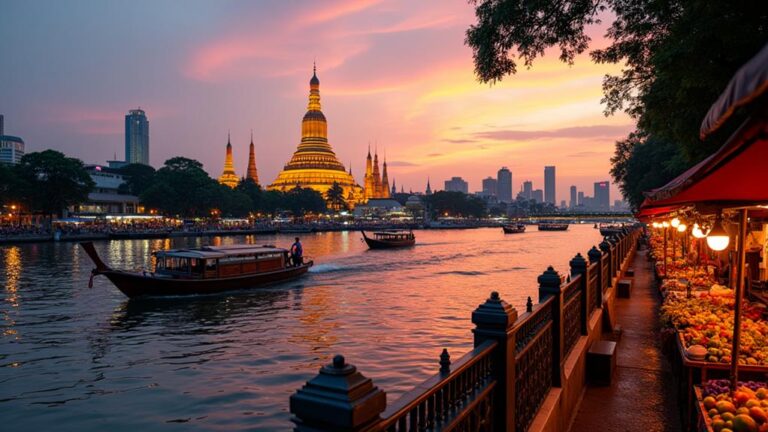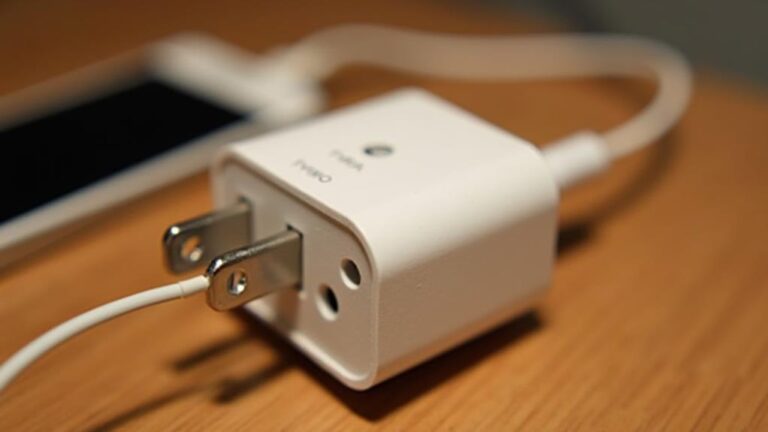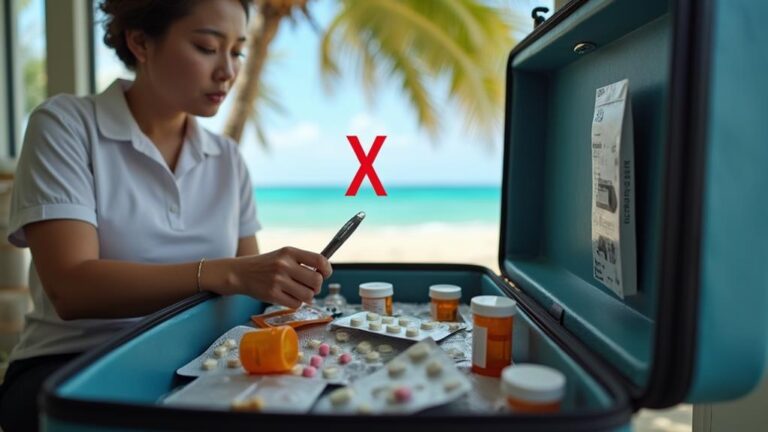Thailand has strict laws prohibiting several items and behaviors. You'll need to be cautious about disrespecting the royal family, as it's a serious offense. Illegal drugs, including recreational cannabis, are strictly forbidden. Obscene literature and pornography are banned, as are inappropriate Buddha images. Don't carry counterfeit currency or documents, as they're illegal. Unapproved telecommunications equipment can land you in trouble, so check regulations before bringing any gear. Finally, restrictions on animal products aim to protect biodiversity. Understanding these prohibitions will help you avoid legal issues and respect local customs during your visit. There's more to learn about navigating Thailand's unique cultural landscape.
Table of Contents
Key Takeaways
- Disrespecting the Thai Royal Family is illegal and can lead to severe legal consequences.
- Possession, distribution, or use of illegal drugs, including recreational cannabis, is strictly prohibited.
- Obscene literature and pornography are banned, with strict enforcement and penalties for violations.
- Inappropriate or disrespectful use of Buddha images is illegal and culturally offensive.
- Counterfeit currency and documents are prohibited, with potential fines, imprisonment, and deportation for offenders.
Disrespecting the Thai Royal Family
When visiting Thailand, it's essential to understand the importance of respecting the Thai Royal Family. The country's strict lese-majeste laws make disrespecting the monarchy a serious offense with severe legal consequences. As a tourist, you must be cautious about your words and actions concerning the Thai Royal Family.
Avoid making negative comments, insults, or mockery directed at the monarchy, as these can lead to police investigations and potential legal actions. Remember that anyone can file a lese-majeste complaint, which means even innocent remarks could be misconstrued and result in trouble.
To show respect, stand still during the national anthem and before movie screenings. This simple gesture demonstrates your awareness of Thai customs and helps you blend in with locals.
It's important to be mindful of your behavior and avoid any actions that could be interpreted as disrespectful to the monarchy.
Illegal Drugs and Substances
Thailand's drug laws are notoriously strict, and you'll want to steer clear of any illegal substances during your visit. The Thai government takes a hard stance on drug-related offenses, imposing severe penalties including lengthy prison sentences and substantial fines for possession of illegal drugs.
While Thailand has legalized medical marijuana, it's important to understand that recreational use remains prohibited. The country strictly regulates cannabis, with restrictions on THC content. If you're caught with amounts exceeding legal limits, you could face serious consequences.
As a tourist, it's vital to avoid all illegal drugs and seek legal ways to enjoy your time in Thailand. Remember that even if you're from a country where certain substances are legal, Thai drug laws apply to everyone within their borders.
Recent developments suggest Thailand may soon ban recreational cannabis use entirely, further reinforcing the country's strict stance on drug regulations. To stay safe and avoid legal trouble, always research and comply with local laws. Don't risk engaging in illegal activities that could ruin your trip and potentially impact your future.
Obscene Literature and Pornography
In keeping with Thailand's conservative cultural values, the country maintains strict laws against obscene literature and pornography. If you're planning a trip to Thailand, it's important to understand these regulations to avoid serious legal consequences.
The possession, distribution, importation, and sale of obscene materials are strictly prohibited in Thailand. This ban extends to all forms of pornography and literature deemed inappropriate by Thai authorities. You should be aware that even having such materials on your electronic devices or in your luggage can lead to severe penalties.
Thai law enforcement actively monitors and enforces these regulations to uphold public decency and morality. If you're caught with obscene literature or pornography, you could face significant fines, imprisonment, and even deportation. The authorities take these offenses seriously, and lack of knowledge of the law isn't considered a valid defense.
To ensure a trouble-free visit, it's best to leave any potentially offensive materials at home. Be mindful of the content on your devices and respect Thailand's cultural norms. By doing so, you'll avoid legal issues and enjoy your time in the Kingdom without worry.
Inappropriate Buddha Images
Beyond the realm of obscene literature, Thailand's cultural sensitivity extends to religious imagery, especially depictions of the Buddha. If you're visiting Thailand, it's essential to understand that inappropriate Buddha images are banned in the country. Thai authorities strictly enforce regulations against misuse or disrespect of these sacred symbols.
You'll need to be aware that it's illegal to use Buddha images for commercial purposes or in ways deemed disrespectful. This includes displaying them in bars or using them for non-religious purposes.
The sale and distribution of Buddha images that aren't culturally respectful or are used for commercial gain are also prohibited.
As a tourist, you should be mindful of these cultural sensitivities. Avoid purchasing or displaying any Buddha images that might be considered inappropriate. Disrespectful portrayals are strictly forbidden, and you could face legal consequences if you're caught with such items.
Counterfeit Currency and Documents

You'll face severe penalties if you're caught with counterfeit currency or documents in Thailand, including hefty fines, imprisonment, and deportation for foreigners. To protect yourself, it's essential to learn how to identify fake money and documents, as even unintentional possession can lead to legal trouble.
Be vigilant when handling cash or important papers, and don't hesitate to use counterfeit detection devices available at many businesses and banks across the country.
Penalties for Possession
Thailand takes a hard line against counterfeit currency and documents. If you're caught with fake money or forged papers, you'll face severe consequences under Thailand's strict laws. Possession of counterfeit currency is illegal and can result in hefty fines and potential imprisonment. The penalties vary based on the amount of fake money you're carrying, but even small quantities can lead to serious trouble.
To avoid legal issues, be aware of these vital points:
- Thoroughly check any currency you receive in Thailand
- Never accept or use suspicious-looking bills or coins
- Report any counterfeit money to local authorities immediately
- Keep your personal documents secure and use only legitimate copies
Thailand laws regarding counterfeit currency and documents apply to both tourists and residents. It's essential to exercise caution and vigilance when handling money or important papers.
If you suspect you've come into possession of fake currency, don't attempt to use it or pass it on. Instead, report it to the authorities right away. Remember, ignorance of the law isn't an excuse, and you could face severe penalties if caught with counterfeit items, even unintentionally. Stay informed and alert to protect yourself from legal trouble during your time in Thailand.
Identifying Fake Documents
Identifying counterfeit currency and documents in Thailand can be challenging, but it's essential for avoiding legal trouble. As a traveler, you need to be vigilant and aware of the risks associated with fake identification documents and counterfeit currency.
To protect yourself, always verify the authenticity of any official documents you receive, especially during financial transactions or government procedures. Be cautious when handling Thai baht, and familiarize yourself with the security features of genuine banknotes. If you suspect you've received counterfeit currency, report it to the authorities immediately.
Remember that possessing or using fake identification documents, such as passports or visas, can result in severe legal consequences. Thai authorities actively monitor for counterfeit documents, including IDs, driver's licenses, and official certificates. If you're caught with fake documents, you could face fines, imprisonment, deportation, and a tarnished legal record.
To stay safe, only obtain documents from official sources and be wary of anyone offering to provide you with fake IDs or currency. By staying vigilant and informed, you can avoid the serious repercussions of dealing with counterfeit items in Thailand.
Unapproved Telecommunications Equipment
Among the items restricted in Thailand, unapproved telecommunications gear stands out as an important concern. If you're planning to travel to Thailand, it's essential to understand the regulations surrounding these devices. The country strictly controls the importation of unauthorized telecommunications gear, including radio transceivers and other devices, to safeguard national security.
To avoid legal consequences and potential confiscation of your devices, make sure that any telecommunications gear you bring into Thailand complies with local regulations and has the necessary permits. Here's what you need to know:
- Unauthorized devices are prohibited by Thai Customs regulations
- Bringing in unapproved gear can result in fines or legal action
- Devices may be confiscated if they don't meet local standards
- Proper licenses are required for certain telecommunications gear
Restricted Animal Products

In recent years, Thailand has tightened its regulations on restricted animal products to protect its biodiversity and combat illegal wildlife trade. The Thai government has implemented strict measures to control the importation of live animals and animal-derived goods, aiming to safeguard local ecosystems and prevent disease outbreaks.
If you're planning a trip to Thailand, it's essential to be aware of these restrictions. You'll need to avoid bringing in any animal products such as ivory, tortoiseshell, or other wildlife items. This ban extends to fur, skins, and products made from endangered species. Even seemingly harmless souvenirs like tusks, shells, or skins are prohibited under Thailand's wildlife protection laws.
Customs officials are vigilant in enforcing these regulations, so it's best to err on the side of caution. Violating these restrictions can result in severe penalties, including hefty fines and legal consequences.
To ensure a smooth entry into the country, leave any questionable animal products at home. By complying with these regulations, you're not only avoiding potential legal issues but also contributing to the preservation of Thailand's rich biodiversity and supporting global efforts to combat illegal wildlife trade.
Frequently Asked Questions
What Can You Not Take Into Thailand?
Ironically, you can't bring your favorite obscene literature to Thailand. You're also forbidden from packing narcotics, fake currency, or unlicensed firearms. Don't forget to leave your Buddha statues and large sums of undeclared cash at home too.
What Can You Not Take Into Thailand?
You can't bring obscene objects, narcotics, or illegal drugs into Thailand. You'll also need permits for firearms, Buddha images, and live animals. Don't forget currency restrictions – you can't take out large amounts of Thai Baht without permission.
What Is Not Allowed to Take From Thailand?
You mustn't take certain sensitive items from Thailand. These include adult-themed objects, illicit substances, counterfeit money, and Buddha images. You'll also face restrictions on firearms, antiques, and Thai currency. Always check current regulations before packing your souvenirs.
What Substances Are Banned in Thailand?
You can't bring narcotics, illegal drugs, or chemical substances into Thailand. Marijuana and cocaine are strictly prohibited. Even synthetic drugs are banned. Medical marijuana's legal under specific conditions, but recreational use is forbidden. Don't risk it – penalties are severe.











